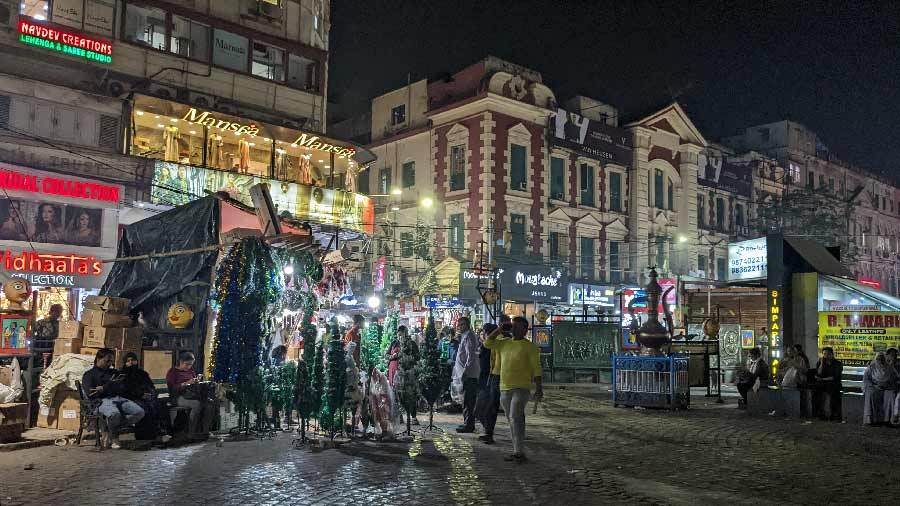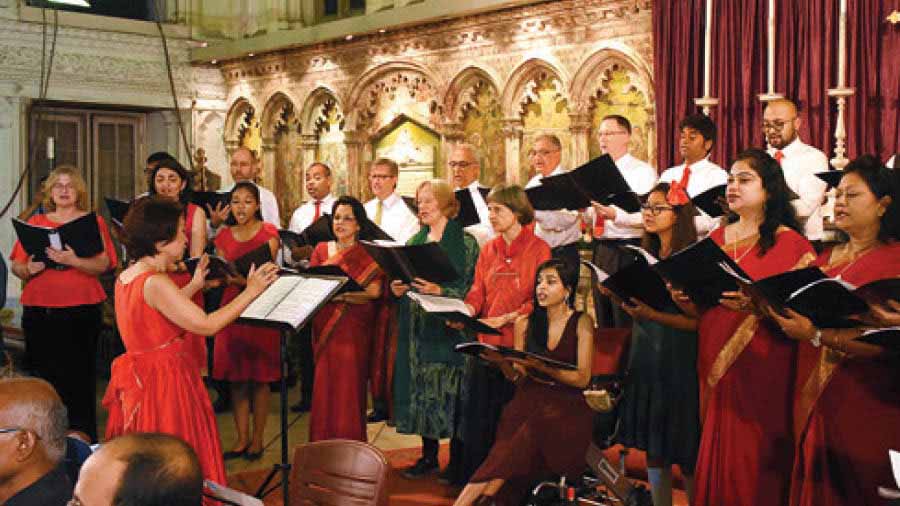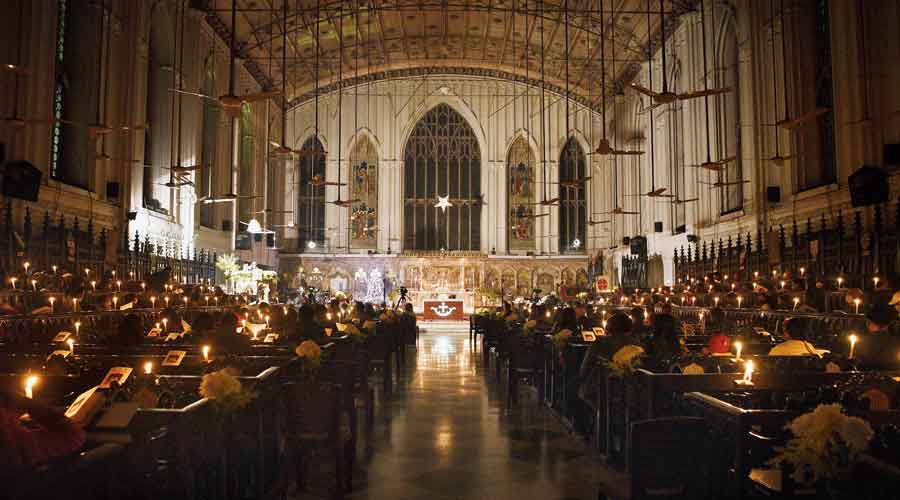Every year around this time there is a sort of resurrection of ancient traditions in Christian households. One is consistently reminded of Charles Dickens’ A Christmas Carol and its Ghosts of Christmas Past, Present and Future. Some of these ghosts have long been put to bed by the new spirits. The spirit of giving is rivalled only by the spirit that attracts excise duty from the off shops. The Christmas Spirit is changing... or should I say the Xmas spirit?
For years families like ours were schooled into believing that we should not use the word Xmas instead of Christmas. Why, I hear you ask? Was it a conscious attempt to take Christ out of Christmas and replace it with “x” the great unknown? Fortunately, times have changed and history indicates that X could indeed stand for Christ. But that X continues to remain unknown to the vast hordes of revellers across the world. Last year, I was appalled to see messages in Christmas lights, which appeared to be appropriating the season. They read, ‘Meri Xmas’ — it’s all mine! In some countries, the use of Xmas or Christmas is banned and now it is ‘Happy Holidays’! So what else has changed?
I recall a time when way before Christmas, a list was created — and sometimes pulled out from yellowing and decaying files of Christmases past. This list had nothing to do with good old Santa’s naughty and nice inventory. This was the list of Christmas cards that needed to be sent. I am old enough to remember that there were ‘Sea Mail’ lists and ‘Airmail’ lists, arranged by the distance of distant relatives mostly living abroad. Once the lists were sorted, the cards that were likely to take the longest to reach would be scheduled first.
Cards were ‘selected’ from New Market, some depicting nativity scenes, some depicting Santa and his elves and some just carrying meaningful messages. The selection process itself was quite elaborate. Find the card that had the right look and feel on the front, open it to read the words and see how appropriate they were, decide whom you could send it to and then hold onto it while you ticked your list. A different card for each person or family for whom you were shopping. The holier cards were selected from the St Paul’s Publications bookshop on Royd Street. These went to the galaxy of priests and nuns in our lives.
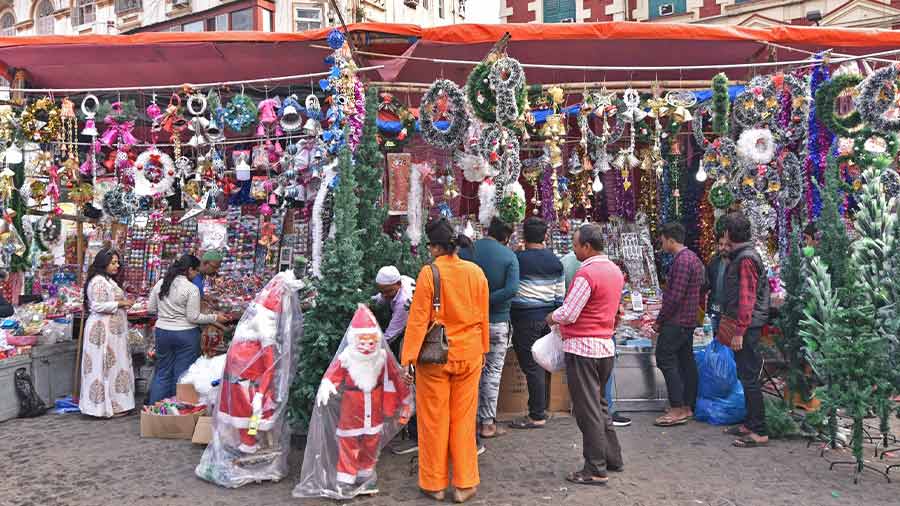
While Christmas shopping at New Market is still a tradition, the shopping list does not include cards anymore Suvendu Das/My Kolkata
Back home, large Catholic families like ours were involved in a conveyor belt production of cards. Mums would check the list, select the card, address it to the family concerned and then pass it round the table for us to write our names after the ‘Love from’ — some cards were just sent from “the family”. Once the cards were all done — and there was a daily quota — it was Dad’s turn. Early next morning, which was 11am in post office terms, he would head over and stand in line for postage stamps. All the USA cards got the same value, as did the UK and other countries. He would then head to the “sticky counter” which had some evil looking green glue to help attach the stamps to the envelopes. Even back then, the licking type of glue that came free didn’t really work. Sticking done, it was back to the line to deposit the cards and have them “crossed”. Later I discovered it was just so the postman didn’t detach the stamps and chuck the cards in a bin. Recycled stamps were apparently a thing back in the day.
While card dispatch was a major operation, card receiving was filled with wonder and delight. They came in ones and twos, then in bunches closer to Bara din. We did not sense any connection with those huge bundles of cards in the postman’s hand and the ever-widening smile on his face! On Christmas Day itself, in our house, he got his reward: a sit-down tea, cake and kalkal (or kul kul) session followed by a “thank you” envelope. (And envelopes were aplenty - with stamps intact!) The cards themselves were lovingly strung up on lines that crisscrossed the living room. As the years went by, relatives fell by the wayside, cards grew less till we were left stringing last year’s greetings on the same string just to make up the number. A couple of long-awaited cards would arrive in February but that’s a story for another post, no pun intended.
Now, the cards are gone. Few, if any, cards reach our letter box, and the postman might still arrive for his cake, but comes with empty hands. Carefully thought out Christmas emails used to be sent with accompanying pictures of the family until very recently, but that too has passed. Today, enterprising and under-employed, creative graphic designers make sure you have enough GIFs and images to select and forward to your entire broadcast list. You can find readymades on various platforms from Canva to 123Greetings and even one named Paperless Post, in a flash of brilliance. This results in your WhatsApp inbox being subjected to multiple copies of the attractive greetings, some of which you are tempted to forward once more. The more enterprising lot invest in those “click here to read the message” links which invariably pop up the same greetings but with your name on it.
On the plus side, everyone is wishing everyone else instead of selecting people to wish. Everyone celebrates everyone else’s festivals, so it’s like national integration on steroids, or the TV company that says ‘Everyone’s invited’. While spring cleaning next year, you don’t need to think about whether you should junk the card, save it for the wishes, for the picture or because it might be the last you get from your aunt. You just long-press and delete! And look at the time and money saved on the postage stamp saga!
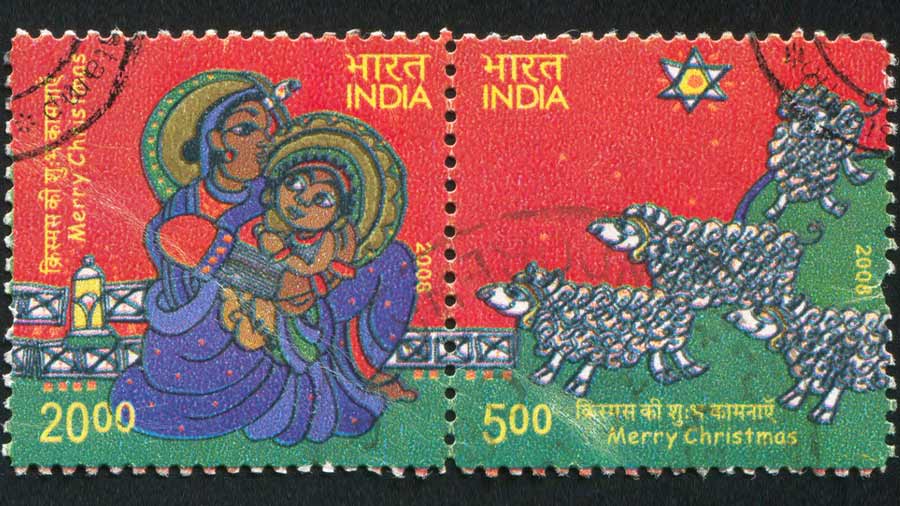
A 2008 commemorative postage stamp depicting Christmas Shutterstock
If you’ve lasted this long in my badly disguised rant, then here’s some good news. The old art of making greeting cards is not lost. There are still several schools and organisations that encourage the children in their care to make their own cards. And families too. I recall days when we would sit at home and create our own cards — own artwork, own words, own sentiment, emotion, and our own mess! This was all highly appreciated by those at the receiving end, and not as highly as the adults at home who had to clean up. I believe, like Shakespeare’s quality of mercy, our cards were twice blessed — they blessed those that created them as well as those who received them.
Some of the schools, especially those for differently-abled children, actually take the artwork created by the children and print them onto cards. People buy packs of these cards to help the cause and the cycle begins again. The Spirit of Giving suddenly re-appears in a wider and more benevolent form with warmth going out with the wishes as never before. Social causes get highlighted, organisations are prepared to buy these cards in bulk, print their own names and messages inside and send them out to customers, vendors and well-wishers.
So before you click send on your WhatsApp broadcast list, do give a thought to the art of sending personalised greeting cards by snail mail — at the very least it might give your local postman an excuse to drop in for tea and cake!
The author is a Goan living in Kolkata and a learning and development consultant who plays music, writes blogs and teaches whenever he can

